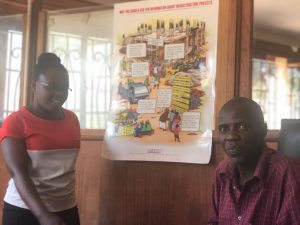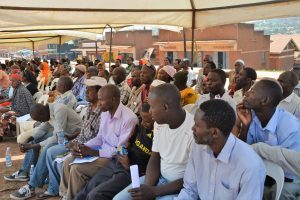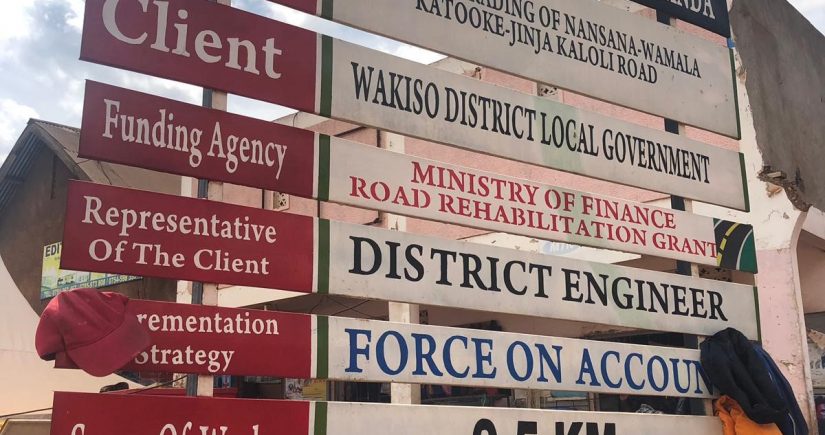The world is increasingly urban: 55% of the world’s population lives in cities and this figure is fast increasing. Central to the discussion about urbanisation is whether local infrastructure can keep pace with growth and ensure that citizens have access to the housing, sanitation and transport they need for a decent standard of living. If it cannot, there is a strong risk that much of world’s urban population will be living in poverty.
Wakiso District, an area which surrounds Kampala in Uganda, has undergone rapid population growth in recent years. It has been confronted by common issues which can develop when an area lacks the necessary infrastructure to support its citizens, and which have been compounded by poor relations between the community and local government.
Yet over time the CoST approach has helped create a better relationship between stakeholders, built on a foundation of trust and a shared ambition to achieve safer, transparent and efficient infrastructure. Below, District Engineer Samuel Mwesigwa, who has been working in the area for five years explains exactly how this change has come about.
Wakiso District in context: a rapidly expanding area
“As Wakiso urbanised, infrastructure was built in any which way – the development of roads and infrastructure was completely unplanned, leading to many of the current problems,” explains Samuel.

These issues were not run-of-the-mill. Poor road construction led to an increase in traffic accidents, and heavy dust from the roads affected the community’s sanitation and local businesses.
Exacerbating these issues was the fact that the infrastructure in place was not properly maintained. With increased urbanisation, the role of local government in the area increased leading to certain responsibilities, such as road repair, being handed over to Wakiso District Council from the local community. Unfortunately, this led to road upgrades not keeping pace with demand.
“Traffic increased, road demand increased and there was a great need for better quality roads… The funding we currently receive would only tarmac a road for 1km, but the district has over 1500 community access roads that need maintenance and upgrades.”
The value of local engagement
In 2015, the Council developed a plan to address infrastructure development issues facing Wakiso, but officials realised that to proceed with their plan they would need to use community land and obtain their permission to do so. This was unlikely given the lack of trust between the community and local government.
“The community was concerned about the Council’s plan for several reasons, including that it was merely a political gesture. They had never seen tarmac on their roads and they didn’t believe it was possible. They were also worried about land compensation and the quality of what would be delivered. We went to the local community to explain to them what the plan was. The community reacted with concern but suggested that if the engineers pegged out the roads (to show where they would go), they might agree. Once we had pegged them out, they agreed.”

From here onwards, Wakiso District Council knew that community participation was critical to the success of their plan. However, with relationships with residents still weak, officials were unsure how to proceed. CoST Uganda put forward several recommendations to the council as to how they could engage with the local community on infrastructure projects. One of these was to hold regular ‘barazas’ – community engagement sessions which give citizens an opportunity to voice their concerns with decision-makers on infrastructure development taking place in their area.
‘’When CoST came they told us what information we needed to provide to the community to avoid any resentment and unnecessary questions. We needed to explain what kind of problems there would be (like dust and disruption), what the time frame would be and how much it would cost. CoST explained how by providing this information, we could improve our accountability to the local community.
We started by improving our communications. Press coverage used to be negative, but through the CoST approach we dug out old procurement files and, by disclosing information Wakiso has been able to attract a lot of good will from the population. People now freely give their land for road works.’’
A flourishing relationship
Since following CoST principles, the relationship between the local community and Wakiso District Council has transformed. Barazas have given the residents the information they need to trust the council in the work that they’re doing, and in return they provide the engineers such as Samuel with information about the local area that they would otherwise not have known, but which is crucial to the infrastructure development taking place.
‘’Since following CoST principles, the community has told us so much that we didn’t know. They understood much more than the engineers who had just come here to build – we thought we had all the information and knew everything, but it was clear after the barazas that we did not. We used to be afraid of disclosure and transparency but now we understand how to work with the community – there are less questions about road development, simply because the community is already aware. The relationship is much better.
People who had given land said, “Oh, I wish I had given even more so the roads would be wider.
Barazas can be challenging, as you don’t know what will be thrown at you. But now we know that we will lose nothing by being transparent.”
